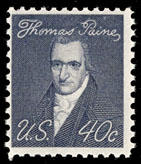Thomas Paine Frases famosas
Variante: O fato de continuarmos a pensar que uma determinada coisa não é errada dá-nos uma aparência superficial de estarmos certos.
“O mundo é o meu país, toda a humanidade são meus irmãos, e fazer o bem é a minha religião.”
The world is my country, all mankind are my brethren, and to do good is my religion.
Thomas Paine in: The Age of Reason, III, 1794
Variante: O mundo é meu país, os humanos são meus irmãos e fazer o bem é minha religião.
“Manter o caráter é bem mais fácil do que recuperá-lo.”
Character is much easier kept than recovered
The American crisis - Página 142 http://books.google.com.br/books?id=vDq6AAAAIAAJ&pg=PA142, Thomas Paine - J. Watson, 1835 - 145 páginas
Citações de homens de Thomas Paine
A Era da Razão
Citações de mundo de Thomas Paine
“Temos o poder de começar o mundo de novo.”
We have it in our power to begin the world over again
Common Sense ... - Página 61 http://books.google.com.br/books?id=wVt7VxvFyegC&pg=PA61, de Thomas Paine - Publicado por Forgotten Books, 1817 ISBN 1606209035, 9781606209035 - 56 páginas
Senso Comum
“A minha pátria é o mundo, e a minha religião a prática do bem.”
my country is the world, and my religion is to do good.
"Rights os Man" in: "The political and miscellaneous works of Thomas Paine" - Chap. V Página 79 http://books.google.com.br/books?id=a5YIAAAAQAAJ&pg=RA7-PA79, de Thomas Paine, Paine - Publicado por R. Carlile, 1819
Thomas Paine frases e citações
Society in every state is a blessing, but government even in its best state is but a necessary evil; in its worst state an intolerable one
"Common Sense" in: "The political and miscellaneous works of Thomas Paine" - Página 5 http://books.google.com.br/books?id=a5YIAAAAQAAJ&pg=PA5, de Thomas Paine - Publicado por R. Carlile, 1819
Senso Comum
“O melhor governo é o que governa menos.”
That government is best which governs least
citação ora atribuída a Thomas Paine, ora a Thomas Jefferson; veja: "Correction Lines: Essays on Land, Leopold, and Conservation" - página 256 http://books.google.com.br/books?id=ueiFrjupXdUC&pg=PA256, nota 25, Por Curt Meine, Publicado por Island Press, 2004 ISBN 1559637323, 9781559637329 296 páginas
Disputadas
“Existem tempos em que as almas são testadas.”
These are the times that try men's souls
The Crisis I, published December, 1776
A Era da Razão
Fonte: The Age of Reason http://books.google.com.br/books?id=vZYIAAAAQAAJ&hl=pt-BR&pg=RA3-PA13#v=onepage&q&f=false (1793) Parte I, pág. 13 ISBN 0517091186.
“Os títulos não passam de apelidos, e todos apelidos são títulos.”
Titles are but nick-names, and every nick-name is a title.
Rights of Man: Being an Answer to Mr. Burke's Attack on the French Revolution - Página 66 http://books.google.com.br/books?id=9FkJAAAAQAAJ&pg=PA66, de Thomas Paine - Publicado por Printed for J.S. Jordan, 1791 - 171 páginas
Senso Comum
“Minha mente é a minha igreja.”
My mind is my own church
The Age of Reason - Página 18, de Thomas Paine, Ernest Renan, Charles Bradlaugh - Publicado por Forgotten Books, 1884 ISBN 1606208535, 9781606208533 - 208 páginas
A Era da Razão
It is impossible to calculate the moral mischief, if I may so express it, that mental lying has produced in society
"The Age of Reason" in: "The Political and Miscellaneous Works of Thomas Paine" - Página 4 http://books.google.com.br/books?id=vZYIAAAAQAAJ&pg=RA7-PA4, de Thomas Paine, Richard Carlile - Publicado por Printed and published by R. Carlile, 1819
A Era da Razão
Government is no farther necessary than to supply the few cases to which society and civilization are not conveniently competent.
"Common Sense" in: "The political and miscellaneous works of Thomas Paine" - Página 20 https://books.google.com.br/books?id=a5YIAAAAQAAJ&pg=RA7-PA79#v=onepage&q&f=false, de Thomas Paine - Publicado por R. Carlile, 1819
Senso Comum
Thomas Paine: Frases em inglês
The Crisis No. VII
1770s, The American Crisis (1776–1783)
1790s, The Age of Reason, Part I (1794)
“[T]he remedy of force can never supply the remedy of reason.”
Part 1.3 Rights of Man
1790s, Rights of Man, Part I (1791)
Fonte: 1790s, The Age of Reason, Part II (1795), Chapter III: Conclusion.
1770s, African Slavery in America (March 1775)
1770s, African Slavery in America (March 1775)
1790s, The Age of Reason, Part I (1794)
1770s, Common Sense (1776)
1770s, African Slavery in America (March 1775)
The Theophilanthropist: Containing Critical, Moral, Theological and Literary Essays, in Monthly Numbers https://books.google.com/books?id=XasOAAAAIAAJ&pg=PA387&lpg=PA387, p. 387
1800s
“[A]ristocracy has a tendency to degenerate the human species.”
Part 1.3 Rights of Man
1790s, Rights of Man, Part I (1791)
1770s, African Slavery in America (March 1775)
Last will (1809), as quoted in The Fortnightly Review https://books.google.com/books?id=PtlBAQAAMAAJ&pg=PA398&lpg=PA398&dq=%22Let+me+have+none+of+your+Popish+stuff%22&source=bl&ots=XKTgMyyfOF&sig=N-KTteQDfZyKQaQA0yyMGyHkBvU&hl=en&sa=X&ved=0ahUKEwiBhM3xmcrLAhXonIMKHSBLCcoQ6AEIIjAD#v=onepage&q=%22Let%20me%20have%20none%20of%20your%20Popish%20stuff%22&f=false, Volume 31, pp. 398–399
1800s
1770s, African Slavery in America (March 1775)
Worship and Church Bells http://thomaspaine.org/essays/french-revolution/worship-and-church-bells.html (1797)
1790s
Recapitulation
1790s, The Age of Reason, Part I (1794)
“And the final event to himself has been, that, as he rose like a rocket, he fell like the stick.”
On Edmund Burke's reactions to the American and French revolutions.
1790s, Letter to the Addressers (1792)
Fonte: 1790s, The Age of Reason, Part II (1795), Chapter I: The Old Testament.
The Crisis No. III.
1770s, The American Crisis (1776–1783)
Part 2.5 Chapter III. Of the old and new systems of government
1790s, Rights of Man, Part 2 (1792)
1790s, First Principles of Government (1795)
The Crisis No. V (1778)
1770s, The American Crisis (1776–1783)
1770s, Common Sense (1776)
